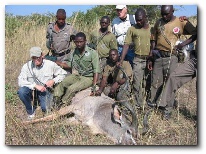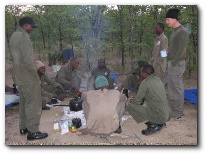News & Updates
Zimbabwe, June 12th 2008
Dear readers,
like I already promised you, May proved to be an interesting and productive month
for us. Here a summary of our findings:
KATSHANA LODGE
On the 2nd of May 2008 the teams patrolled Khatshana Lodge (about 8 km from our
base Hwange Safari Lodge) with three volunteers from abroad. On patrol the team
heard a noise that proved to be a buffalo cow in a cable snare. The animal tried by all
means to pull herself out of harms way but of course actually doing the opposite. Two
Anti Poaching members were sent by foot to go inform Mr Peter Blinston and Mrs.
Ester Van Meer (PDC) to come and dart/immobilize the animal, since we still face a
communication breakdown (repeater was stolen).
Unfortunately the animal died before they had arrived. The next day the teams
patrolled Khatshana Lodge area again and also with two (other) volunteers, to
re-search that area from the other side. Now they recovered sixteen (steel) snares.
In one of them a big
male kudu was caught.
On the 5th of May 2008 the patrol team moved to Khatshana Lodge again to clear the
area for the last time and recovered another 4 snares.
Good news was that when Martin brought us to the scene that day, we came across
the potential suspect of these killings and with the assistance from the Police he
managed to arrest the suspect. Sad detail was that this particular suspect was the
same person that was resposible for 'looking after' Katshana Lodge, at the time
operated by Touch The Wild safaris. Totally there were 36 snares found. The
suspect was found guilty as charged.
WEXAU OPERATION
On the 7th of May 2008 our team assisted National Parks and Wildlife Authority
Zimbabwe. Whe announced ourselfes at Wildernes safari's 'Linkwasha' camp and
made our camp at Wexau pan on the South Eastern side of Hwange National Park
about 11 km from the boundary.
The following day the teams patrolled around Mfagazana and Tum tum pans heading
too Gwenga pan. We had split our team into two teams, each team accompanied by a
National Parks scout.
Team one recovered one snare while team two recovered fifteen snares and found
two old buffalo carcasses in some of the snares. All the snares found were set around
pans and mainly set for buffalo. At Gwenga pan we found spoors from three poachers
and three domestic dogs.
The next day the teams patrolled together from Hwahwa du pan to Major pan. They
recoverd four snares which were set around a salt pan. These are popular by animals
since they provide needed minerals to their diet. Three of the snares were broken.
Snares were set for impala sized animals. The patrol team also found a poacher's
base.
It indicated that the poachers had camped for some days and dried the meat. The
team also discovered one broken snare, in which a buffalo was caught. There were
many buffalo spoors around the scene. We recovered seventeen snares this day.
On the 10th of May 2008 the team patrolled towards Magotshanyutshi pan. We
recovered five snares along the way to the pan. We searched around
Magotshanyutshi pan and recovered another six snares set around this pan. Again all
the snares were set for buffalo sized animals.The team then patrolled along the Parks
boundary and found spoors from poachers who get into the National Park. The area is
known for active poachers from many villages at the parks boundary.
A total of 44 snares were recovered during this operation. A clear indication of high
poaching activity.
FORESTRY COMMISSION OPERATION
On the 13th of May 2008 ALL4AP and PDC's Ganda team conducted an operation at
Sikumi Forestry Commission (FC). Sikumi Forestry Commission is situated at Dete
Township. The teams patrolled from the (FC) base and patrolled around Jwapi Lodge
were one snare was recovered for the day.
On the 14th of May 2008 they patrolled up to boundary of Lupote and Dingani
communal areas. A few spoors were seen in the forest from domestic dogs and five
snares were recovered. The snares found appeared to be old.
On the 15th of May 2008 the teams patrolled from the camp and patrolled the
peripharals of Mabale, Dopota and Dingani communal areas. Five snares were
recovered by both teams. Poaching in this area is reletively low looking at the number
of snares found, 11 snares in all.
GWAYI OPERATION
On the 21 0f May 2008 the ALL4AP and PDC teams deployed at Gwayi conservancy to
patrol Good luck and Kalambeza Farms, somewhat further awy from our regular
patrolled areas.
On the first day the team patrolled Good Luck farm and recovered one old snare.
The second day they patrolled Kalambeza farm in the early morning. (Martin claimed
to be frozen on top of his car since the temperature was only 3Cº…)
After recovering one snare we patrolled further and saw human boot prints. When we
tracked back the spoors they led us to were mopane tree was cut and used to direct
animals in a snare that was set for impala sized animals. One print was of a sandal
with a hole at the heel and the the other was self made from old tyres.
The patrol team then tracked the spoors which led them to Kalambeza farm where
they found four men. We already suspected the people from Kalambeze farm since
the snare was found at only 300meters from the camp.
We identified ourselfes as Anti Poaching unit and told them they were following two
spoors that led to their camp. The team searched and recovered eighteen snares,
laying just behind the camp houses. After thorough investigation we arrested two of
the four suspects since we could only prove that these had been at the poaching
scene. One of them tried to hide evidence by braking his sandal and hiding it under
his bed. The suspects were taken to Gwayi Police Station for further investigation. The
main suspect denied during police interrigation that he had admitted to have set the
snare that we found to us at the scene, but we could show the Police a video fragment
in which he clearly stated he had set the snare.
A reminder to always search for enough evidence.
Again these suspects were the people that were suppose to look after the camp whilst
the owner was elswere.
A total of 26 snares were recovered in this operation.
GWAYI, HANKANO OPERATION
On the 28th we conducted an operation at Hankano and Gwayi Farms. The team
patrolled along the boundary of Hankano and Gwayi farms. We recovered eleven
snares set for guinea fowls. The patrol recovered seventeen snares set for big game.
The following day the team patrolled Hankano farm but no snares were recovered.
On the 30th of May 2008 the team had a look in Gwayi farm. We recovered four
snares.
Three were cable snares and one was made from steel/copper (telephone wire).
A total of 32 snares were recovered during this operation.
STAKEHOLDER MEETING
A stakeholder meeting was conducted at Hwange Safari Lodge, our home ground.
ALL4AP was represented by Martin. Hot topic was the grading of roads and fireguars,
since the dry season is coming closer. The agreed resolution to bring in 50 liters of
diesel and some funds for the tractor drivers proved relatively easy in the Hwange
Safari Lodge area but very difficult in the Gwayi and Halfway House area. In this area
stakeholders do not seem to be interested in the resolutions made up by the
stakeholders. This is sad, especially for the few stakeholders that are very willing to
cooperate for the best of the Conservancy. They fear for bush fires and large
destruction of their land if nothing will be done.
COMMENTS
After varied short patrols in the National Park, Forestry areas and Gwayi area we can
see that poaching is still present and on the increase in almost all areas.
A total of 152 snares were found and removed this month.
This is more than 4 times the amount collected by 2 teams last year.
Disturbing is the fact that most of the poachers arrested were actually the ones that
should have looked after the farms and their wildlife inhabitants.
The fact that there were no snares found in some farms could be interpreted that
there is no poaching. Fact is that actually hardly any signs of wildlife, like droppings or
spoors were found, meaning that the place already has been poached empty, this
despite the fact that there was water available for game. A serious indicator of what
poaching can do to an area.
Comparing our (ALL4AP) snare data (total of snares removed) with the
data from PDC's Ganda team from last year we already exceed their
number for the full year of 2007.
A clear indication that poaching is on the increase at this moment.
We hope these signs will be taken seriously by the stakeholders involved, to prevent
more damage.
All the best and see you next month,
Martin & team
Team and volunteers with snared kudu
Early morning Kalambeza 3Cº
June 2008: Sponsor SAVE visits our project
On the 2nd of June 2008, one of our sponsor organisations SAVE from Australia
visited our project.
Martin and team held a special presentation to them to show them our achievements
so far.
Although the people were tired from travelling, it did not stop them from joining us
the next morning for a joint patrol!
It was a pleasure to have them and we hope to see them back next year!
Martin & team











